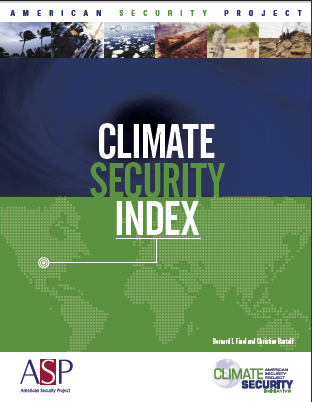
Climate Security Index
 Changes in the Earth’s climate are more evident every day, but the United States has failed to act, alone or with allies, to avoid disaster.
Changes in the Earth’s climate are more evident every day, but the United States has failed to act, alone or with allies, to avoid disaster.
This examination of the national security implications of climate change adds an important piece to the public debate — a piece that has been missing for too long. Addressing the consequences of changes in the Earth’s climate is not simply about saving polar bears or preserving the beauty of mountain glaciers, important as those are. Climate change is a threat to our national security. Taking it head on is about preserving our way of life.
The consequences of climate change will be found, and are being found now around the world. New climate conditions will drive human beings to move in ever larger numbers, seeking food, water, shelter and work. No region will be immune. Climate refugees will increasingly cross our own borders. The stress of changes in the environment will further weaken marginal states. Failing states will incubate extremism. In South Asia, the melting of Himalayan glaciers jeopardizes fresh water supplies for more than one billion human beings. In North America, agriculture could be disrupted by increases in temperatures and shifting weather patterns that limit rainfall. Globally, major urban centers could be threatened by rising sea levels. Malaria and other tropical diseases are moving into new areas, and outbreaks are increasing in frequency as the planet warms and weather patterns change. All of this is just the foretaste of a bitter cup from which we can expect to drink should we fail to address, urgently, the threats posed by climate change to our national security.
You can download the full report here.





